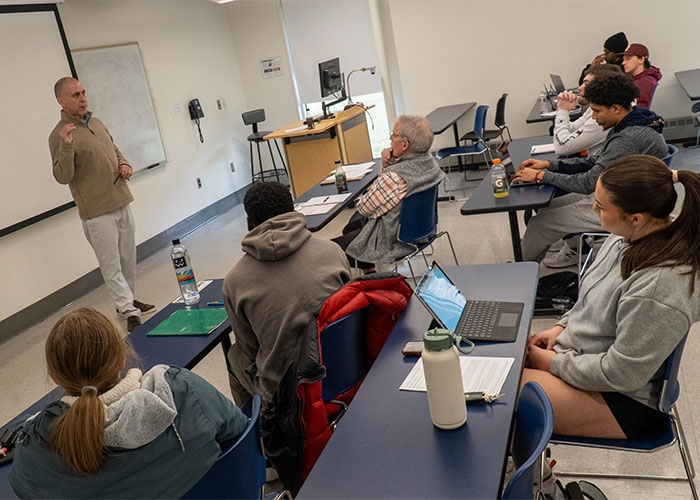Q&A With CEO of the National Association of Collegiate Directors of Athletics
- News & Events
- News
- Q&A With CEO of the National Association of Collegiate Directors of Athletics

As leader of the nation’s largest professional and educational association for intercollegiate athletics administrators, Pat Manak says it’s exciting to see the burgeoning growth in the sports management field.
With over 22,000 members, the National Association of Collegiate Directors of Athletics (NACDA) is a behemoth in the sports world. Its wide-ranging mission includes providing educational opportunities and serving as a vehicle for networking and advocacy on behalf of the athletics administration profession.
Patrick Manak became NACDA’s CEO in January 2023. Recently, he paid a visit to students enrolled in RIC’s new sports management program to give his take on their promising future in his field.
Why do you think that the sports management industry has grown so swiftly in recent years?
Going back to the 1990s when I started out in this industry, there were only a handful of sports administration programs across the country. Over time it has exploded. More schools are investing in it and more students are interested in it because there’s so many different career paths in sports management.

What are some of the careers out there for those who have a sports management degree?
A plethora of careers are available. If you want to go the high school route, there’s a big need for high school athletics directors across the country. Obviously, within the collegiate space that RIC occupies, there are several different positions within an athletics department, ranging from the athletics director down to professionals in areas such as marketing, development, fundraising and licensing. In the pro sports ranks, there are opportunities as well. However, there are fewer professional teams, so the opportunities are much less than at the college level. And then there’s the corporate sector. If you look at companies like Nike, Coca-Cola or Capital One, there are plenty of positions for people who want to get into this sector. Corporations want to team up with sports franchises to market their products and services. That’s an area of our industry that continues to boom.
What is the pay like in these careers?
The pay varies. Like anything else, you have to work your way up, depending on what you embark upon. The high school and college route probably pays on the lighter side when compared to opportunities in the professional and corporate ranks. However, if you’re willing to put in the effort, you’re going to be rewarded. I tell young people all the time that they’re not getting into this field to break the bank. They should do this because it’s a passion. There are ways to make good salaries in the field, but that shouldn’t be the driving factor.
Do you need to be an athlete or knowledgeable about the sports world to go into this field?
I don’t think a person would need to be a former athlete to succeed in this industry. But would you have an advantage if you are an athlete? I think so, especially within the collegiate ranks. When we look at people who were former student athletes, they’ve already invested in time management, working for a team, putting in extra hours, multitasking – all the successful attributes of an individual entering a sports management position. However, since there’s more people getting into this industry than ever before, we can’t solely look at former student athletes to fill all the positions.
What qualities do you need to be successful?
Hard work, dedication, passion, motivation, being a team player – attributes that make you successful in all areas of life. However, there’s another attribute in our industry that is a key to becoming successful – relationship building. You’re known – whether in a good or bad way – relatively quickly.
Is there an aspect of RIC’s sports management program that stands out?
As head of RIC’s sports management program, David Roach stands out. Very few sports management programs across the country have the wealth of knowledge and experience of someone who was an athletics director at three different Division I schools and coached at another Division I school. Roach provides the students in this program with so much knowledge and best practices about what he’s seen from both the successful and not-so successful side. I know this program is brand new but to have him in place as part of the foundation, these students are fortunate. They should tap into his knowledge base and not take it for granted.
How has NACDA influenced the sports management field?
NACDA has its own internship program. I was once one of their interns. What NACDA is able to do is bring in young people who are looking to take their first steps in the industry. We have them for a full year, so, we’re able to mold, guide, educate and share all our past experiences – whether good or bad – with them. The floodgates are opened for them during their internship to meet and interact with a whole different clientele who they haven’t been exposed to before. From the very beginning, we tell them that our duty is to get them full-time employment. We’ve been very fortunate over the years to attract great individuals who have gone on to enjoy successful careers in athletics administration.
